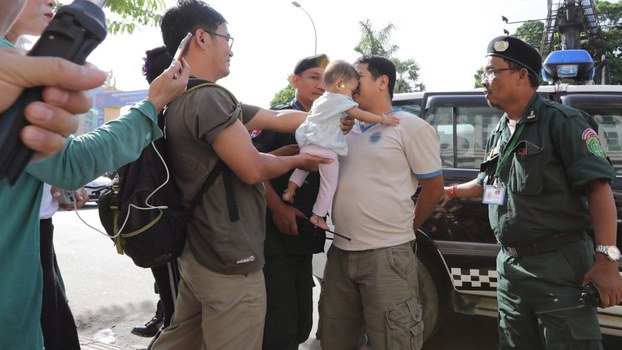




Cambodia must end its campaign of “arbitrarily arresting and prosecuting” former members of the country’s banned opposition Cambodia National Rescue Party (CNRP) and release all prisoners held for peacefully exercising their rights, London-based rights group Amnesty International said Tuesday.
In August, the CNRP announced that acting president Sam Rainsy will return to Cambodia from self-imposed exile along with other party leaders on Nov. 9 to lead a “restoration of democracy” in the country through nonviolent demonstrations, calling on supporters and members of the military to join him.
Authorities have labeled the plan part of a coup attempt and launched a crackdown on former party members and activists since then, jailing at least 41 and subjecting 88 others to politically motivated charges including “plotting against the state,” while threatening prosecution against anyone expressing support for the return of Sam Rainsy and other top opposition officials.
In a statement on Tuesday, Amnesty International demanded an end to the arrests and jailings, and urged the international community to pressure Cambodia over what it termed a “rapidly deteriorating human rights situation” in the country.
“Amnesty International calls on the Cambodian authorities to immediately release all individuals imprisoned for the peaceful exercise of their human rights and for all politically-motivated charges against them to be dropped,” the group said.
“The authorities must further ensure that all individuals are allowed to freely exercise their rights to freedom of expression and peaceful assembly, in accordance with the Cambodian constitution and international human rights law.”
Amnesty noted that at least two CNRP activists have died while in police custody since April, while Cambodian authorities have also attempted to thwart the return of Sam Rainsy and other CNRP leaders by warning airline companies against ferrying them and issuing warrants for their arrest to fellow Association of Southeast Asian Nations (ASEAN) states.
It said that these developments, coupled with the militarization of Cambodia’s border provinces, Prime Minister Hun Sen’s orders to the military to attack any opposition gatherings held on the date of the planned return, and live-fire military exercises and troop deployments along the Thai border, “have further contributed to significant concerns about the potential for violence on Nov. 9.”
The group also highlighted the de facto house arrest of CNRP president Kem Sokha, who has been detained since his arrest in September 2017 on charges of “treason.”
“Amnesty International calls upon the international community to closely monitor the rapidly deteriorating human rights situation in Cambodia,” the statement said.
“States should promote respect for the human rights of all Cambodians in line with their obligations under the Paris Peace Accords of 1991, which assigned a historic responsibility to the United Nations and the international community to support the realization of peace and human rights in Cambodia,” it added, referring to the agreement that ended civil war and established democratic elections in the country.
Responding to Amnesty’s statement on Tuesday, Cambodia’s Ministry of Justice spokesman Chhin Malin said that the group had failed to consider the country’s legal system before making its allegations.
“The [CNRP] actions are not about political freedom through democratic means—they have broken the law,” he said.
New arrests
Amnesty’s statement came as authorities arrested 10 security personnel guarding the CNRP’s headquarters in the capital’ Meanchey district on Tuesday, Phnom Penh police chief Sar Thet told RFA’s Khmer Service.
“They organized plans to welcome the rebels,” he said, adding that police had confiscated documents detailing plans for Sam Rainsy’s return.
“The rebels are part of an illegal group—this isn’t about democracy.”
The 10 security guards will face charges of “plotting a coup” at the Phnom Penh Municipal Court, Sar Thet said.
Also on Tuesday, police in Kampong Speu province arrested CNRP activist Hem Newdaly, also for “plotting a coup,” according to local media reports.
Speaking to RFA, Am Sam Ath, an official with Cambodian rights group Licadho, called the arrests “yet another attempt to intimidate CNRP supporters against participating in Sam Rainsy’s repatriation.”
“Human rights and democracy are rapidly deteriorating” in Cambodia, he said, noting that the government is ignoring recommendations by Western governments to reverse democratic rollbacks in the country.
CNRP deputy president Mu Sochua called the arrests “a human rights violation” during an interview in Indonesia, where she is helping to prepare for Sam Rainsy’s return to Cambodia, and demanded their immediate release.
Returning ‘unarmed’
The CNRP deputy also told RFA that her party has “no plans to change our return to Cambodia as scheduled on Nov. 9 through the Thai-Khmer border” and said that it has the backing of a large network of Cambodian migrant workers in Thailand.
But she advised Thailand’s government, which blocked her entry to the country last month citing “security concerns,” that the CNRP “has no intent to provoke unrest in Thailand,” even while the party is “actively working on Thai soil” to prepare for Sam Rainsy’s repatriation.
“Our Khmer migrant workers are hungry to repatriate and reunite their families in a bid to find a resolution for the country, because all of them understand that it is necessary to change the leadership to ensure a real democracy,” she said.
Mu Sochua also appealed to Hun Sen to refrain from using the armed forces against “innocent people” or initiating what she termed a “war on Cambodians.”
“We want a resolution—we won’t cause violence, because our Khmer people don’t have weapons,” she said.
“Hun Sen is afraid of the migrant workers returning to the country unarmed … The people should ask him why he is blocking us from entering our Khmer homeland.”
Reported by RFA’s Khmer Service. Translated by Samean Yun. Written in English by Joshua Lipes.